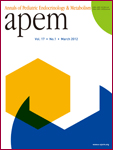
MOLECULAR AND CELLULAR ENDOCRINOLOGY
Scope & Guideline
Driving innovation in biochemistry and cellular endocrinology.
Introduction
Aims and Scopes
- Hormonal signaling pathways:
The journal publishes research on various hormonal signaling pathways, including steroid hormones, peptides, and their receptors, elucidating their roles in health and disease. - Endocrine system interactions:
Research articles often explore the interactions within the endocrine system, including feedback mechanisms, cross-talk between different hormones, and the impact of environmental factors on endocrine functions. - Metabolism and endocrine regulation:
A significant focus is on how hormones regulate metabolism, including studies on obesity, diabetes, and metabolic syndromes, highlighting the role of hormones in energy homeostasis. - Developmental endocrinology:
The journal features studies on the role of hormones during development, particularly how endocrine signaling influences growth, differentiation, and reproductive processes. - Pathophysiology of endocrine disorders:
The journal addresses the molecular and cellular mechanisms underlying endocrine disorders, such as thyroid dysfunction, adrenal disorders, and reproductive system diseases. - Emerging technologies in endocrinology:
It also emphasizes the use of novel technologies and methodologies in the study of endocrine functions, including genomics, proteomics, and metabolomics.
Trending and Emerging
- MicroRNA and non-coding RNA in endocrinology:
There is a growing emphasis on the role of microRNAs and long non-coding RNAs in regulating endocrine functions and their implications in diseases, particularly in cancer and metabolic disorders. - Endocrine disruptors and environmental impacts:
Research focusing on endocrine disruptors, their mechanisms, and their effects on human health and development is gaining traction, highlighting the importance of environmental factors in endocrinology. - Sexual dimorphism in hormone action:
Emerging studies are increasingly exploring the differences in hormonal responses between sexes, particularly in metabolic and reproductive contexts, acknowledging the complexity of hormonal signaling. - Integration of systems biology in endocrinology:
There is a trend towards integrating systems biology approaches to better understand the complex interactions within the endocrine system and their implications for health and disease. - Therapeutic targeting of hormonal pathways:
Research aimed at identifying therapeutic strategies that target specific hormonal pathways to treat endocrine disorders is on the rise, reflecting advancements in precision medicine.
Declining or Waning
- Historical perspectives on endocrinology:
There has been a noticeable decrease in articles focusing on historical perspectives of endocrine systems, as the field moves towards more contemporary and applied research. - Invertebrate endocrinology:
Research pertaining to invertebrate endocrine systems has dwindled, possibly due to the increasing emphasis on vertebrate models that are more relevant to human health. - Basic research on classical hormones:
The exploration of classical hormones such as insulin, glucagon, and thyroid hormones in isolation is less frequent, as the focus shifts towards complex interactions and multi-hormonal systems. - Non-hormonal endocrine disruptors:
There appears to be a waning interest in the effects of non-hormonal endocrine disruptors, as the field increasingly prioritizes the study of hormonal interactions and their physiological impacts.
Similar Journals

TRENDS IN ENDOCRINOLOGY AND METABOLISM
Leading the charge in endocrine research.TRENDS IN ENDOCRINOLOGY AND METABOLISM, published by CELL PRESS, stands as a pivotal resource in the fields of endocrinology, diabetes, and metabolism. With its ISSN 1043-2760 and E-ISSN 1879-3061, this esteemed journal has been a leading platform since its inception in 1989, currently projected to span until 2024. Recognized within the top quartile (Q1) of its category, it boasts impressive Scopus rankings, holding the 4th position in Endocrinology and 8th in Endocrinology, Diabetes, and Metabolism. These rankings underscore its significant impact, evidenced by an impressive percentile rank of 97th and 96th respectively. The journal is committed to facilitating the dissemination of cutting-edge research and innovative insights, making it an essential read for researchers, clinicians, and students seeking to stay informed on the latest advancements in these critical fields. With a robust focus on providing thorough reviews and original research articles, TRENDS IN ENDOCRINOLOGY AND METABOLISM continues to shape the understanding and treatment of metabolic disorders.

JOURNAL OF ENDOCRINOLOGICAL INVESTIGATION
Spearheading Discoveries in Hormonal DynamicsJOURNAL OF ENDOCRINOLOGICAL INVESTIGATION, published by SPRINGER, is a leading peer-reviewed journal dedicated to advancing the field of endocrinology. With a remarkable history dating back to 1978 and a convergence set until 2024, this journal serves as a vital source for researchers, clinicians, and students focusing on the intricate interplay of hormonal regulation and its implications for health and disease. The journal is recognized in the Q2 category for both Endocrinology and Endocrinology, Diabetes and Metabolism, highlighting its relevance and impact within the scientific community, exemplified by its strong Scopus rankings. While it does not offer open access, it ensures that high-quality research, reviews, and significant clinical findings are accessible to its readership. With a commitment to improving patient outcomes and elucidating complex biological mechanisms, the JOURNAL OF ENDOCRINOLOGICAL INVESTIGATION remains a cornerstone publication for anyone involved in the study or practice of endocrinology.

JOURNAL OF ENDOCRINOLOGY
Driving Discoveries in Diabetes and Metabolic DisordersJOURNAL OF ENDOCRINOLOGY, established in 1946 and published by BIOSCIENTIFICA LTD, stands as a premier scholarly outlet in the field of endocrinology, diabetes, and metabolism. With an impressive H-Index reflecting its significant contribution to the literature, this journal maintains a strong presence in academic circles, evidenced by its Q1 ranking in the 2023 Scopus categories for both Endocrinology and Diabetes and Metabolism. With its targeted scope serving a global audience of researchers, professionals, and students, it provides a vital platform for disseminating innovative research findings and advancing the scientific understanding of endocrine systems. As we approach its convergence year of 2024, JOURNAL OF ENDOCRINOLOGY remains committed to publishing high-quality, peer-reviewed articles that explore cutting-edge developments in the field, thereby impacting clinical practices and guiding future research directions.

JOURNAL OF STEROID BIOCHEMISTRY AND MOLECULAR BIOLOGY
Driving Innovation in Endocrinology and BiochemistryJOURNAL OF STEROID BIOCHEMISTRY AND MOLECULAR BIOLOGY is a distinguished peer-reviewed journal published by Pergamon-Elsevier Science Ltd, committed to advancing the fields of biochemistry, molecular biology, and endocrinology. With an ISSN of 0960-0760 and an E-ISSN of 1879-1220, this journal has garnered a notable reputation, securing a Q2 ranking in numerous categories, including Biochemistry, Cell Biology, and Clinical Biochemistry, as of 2023. Hailing from the United Kingdom, it serves as a critical platform for the dissemination of impactful research from 1990 to 2025 and beyond. Although it does not currently offer open access options, the journal's comprehensive coverage and rigorous peer review process ensure high-quality publications that significantly contribute to the understanding of steroid biochemistry and related fields. Targeting a diverse audience of researchers, professionals, and students, the journal remains an essential resource for those seeking to stay at the forefront of scientific innovation and discovery.

Nature Reviews Endocrinology
Fostering innovation in endocrine research.Nature Reviews Endocrinology is a premier journal published by NATURE PORTFOLIO, providing comprehensive and critical reviews in the rapidly evolving field of endocrinology. Established to foster advanced understanding, it has become a vital resource for researchers, professionals, and students alike. With an impressive impact factor and a prominent ranking of Q1 in both Endocrinology and Endocrinology, Diabetes, and Metabolism categories for 2023, the journal is recognized for its high-quality research dissemination, evidenced by its rankings of #2 out of 244 in Medicine and #2 out of 128 in Biochemistry, Genetics, and Molecular Biology. Spanning the years from 2009 to 2024, it focuses on publishing cutting-edge information that shapes current scientific knowledge and clinical practices. The journal offers open access options, ensuring greater visibility and reach for its articles. Located in Germany, this journal remains at the forefront of endocrinology research, significantly contributing to the understanding of hormonal functions and their implications on health. Discover the latest advancements and insights by exploring Nature Reviews Endocrinology.

HORMONE AND METABOLIC RESEARCH
Unraveling the Complexities of Hormonal InfluenceHORMONE AND METABOLIC RESEARCH, published by GEORG THIEME VERLAG KG, stands as a reputable platform in the fields of biochemistry, endocrinology, and metabolism since its establishment in 1969. This peer-reviewed journal provides critical insights and advancements in the intricate relationships between hormones and metabolic processes, catering to researchers, healthcare professionals, and students alike. With an impressive convergence of knowledge spanning over five decades, it maintains a commendable Q3 ranking in multiple categories, including Biochemistry, Clinical Biochemistry, and Endocrinology, highlighting its contribution to cutting-edge scientific discourse. Although not an open-access journal, it offers a plethora of access options for readers and institutions, ensuring that vital research reaches those who need it most. Located in Stuttgart, Germany, the journal is positioned at the forefront of influential research in hormone and metabolic studies, emphasizing its importance for ongoing investigations into health and disease.

Archives of Endocrinology Metabolism
Advancing knowledge in endocrinology and metabolism.Archives of Endocrinology Metabolism is a distinguished open-access journal dedicated to advancing the field of endocrinology and metabolism. Published by SBEM-SOC BRASIL ENDOCRINOLOGIA & METABOLOGIA, this journal has established itself as a vital platform for researchers, clinicians, and scholars since its inception in 2008. With an ISSN of 2359-3997 and E-ISSN of 2359-4292, it aims to disseminate high-quality research articles that explore the latest advancements in endocrinology, diabetes, and metabolism. As of 2023, it has achieved a commendable Q3 ranking in its field, demonstrating its relevancy and increasing visibility among peers. The journal's focus spans various sub-disciplines, including hormonal regulation, metabolic disorders, and innovative therapies, making it an essential resource for both emerging professionals and seasoned experts alike. With a rich repository of research from Brazil and beyond, Archives of Endocrinology Metabolism continuously seeks to contribute to the ongoing dialogue and collaboration within the global scientific community.

Hormones-International Journal of Endocrinology and Metabolism
Transforming Understanding in Endocrinology and MetabolismHormones - International Journal of Endocrinology and Metabolism, published by Springer International Publishing AG, is a vital resource within the field of Endocrinology, Diabetes, and Metabolism. Since its inception in 2005, this journal has made significant contributions to the understanding of hormonal mechanisms and their implications across various medical disciplines. With a current impact factor that places it in the Q3 category for Endocrinology and the Q2 category for miscellaneous Medicine – as indicated by its Scopus rankings – it stands out as a reputable platform for cutting-edge research and clinical findings. Although it operates under a subscription model, the journal's comprehensive scope encompasses basic and applied scientific studies, making it essential reading for researchers, clinicians, and students alike. The journal is headquartered in Germany with a strong commitment to promoting scholarly communication and knowledge dissemination within its specialized fields through the year 2024 and beyond.

Annals of Pediatric Endocrinology & Metabolism
Connecting global experts to enhance child health outcomes.Annals of Pediatric Endocrinology & Metabolism, published by the Korean Society of Pediatric Endocrinology, is a vital resource for researchers, healthcare professionals, and students in the fields of endocrinology, diabetes, and pediatric health. With its commitment to open access since 2012, the journal facilitates the dissemination of groundbreaking research on pediatric endocrine disorders and metabolic diseases, ensuring that vital knowledge is accessible to a global audience. The journal maintains a reputable standing with a 2023 Scopus rank of #92 in Pediatrics and a Q3 quartile in Endocrinology, highlighting its impact on the field. Originating from South Korea, the journal fosters a collaborative network of researchers and advocates best practices in pediatric care through interdisciplinary studies. The Annals not only enhances scientific understanding but also emphasizes practical applications aimed at improving child health outcomes, making it an essential publication for academics and practitioners alike.

GENERAL AND COMPARATIVE ENDOCRINOLOGY
Fostering innovative research in comparative endocrinology.GENERAL AND COMPARATIVE ENDOCRINOLOGY, published by Academic Press Inc Elsevier Science, is a distinguished journal that has been at the forefront of endocrine research since its inception in 1961. With an ISSN of 0016-6480 and an E-ISSN of 1095-6840, this journal caters to a diverse audience, including researchers, professionals, and students in the fields of animal science, zoology, and endocrinology. It holds a prestigious Q1 ranking in Animal Science and Zoology and is recognized in the Q3 quartile for Endocrinology, indicating its significant contribution to advancing scientific knowledge. The journal is also well-regarded within the Scopus rankings, with impressive placements in multiple categories, highlighting its impact and relevance in the academic community. By focusing on comparative analyses and fostering a deeper understanding of hormone function and regulation across species, GENERAL AND COMPARATIVE ENDOCRINOLOGY aims to bridge gaps in knowledge and stimulate innovative research paradigms. While it does not currently offer Open Access, the journal remains committed to high-quality peer-reviewed content, making it an essential resource for anyone engaged in this vital field of study.